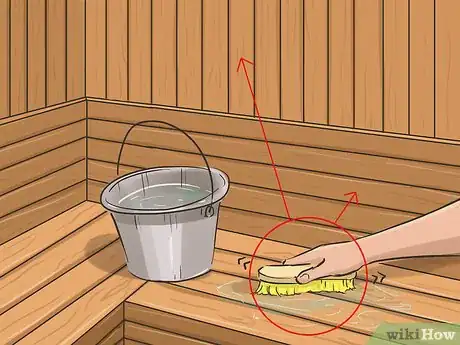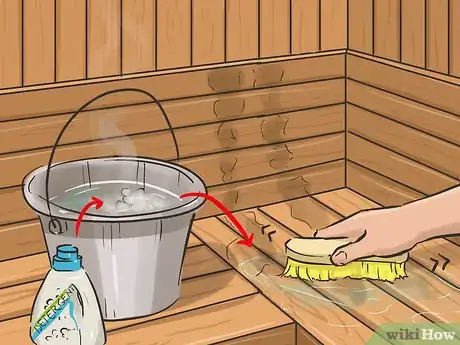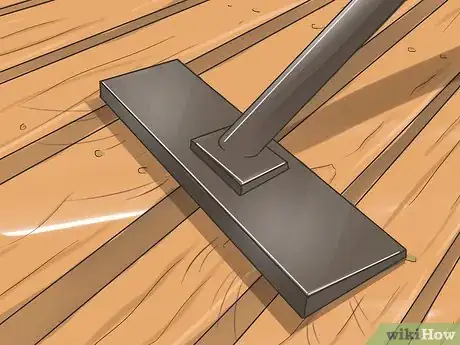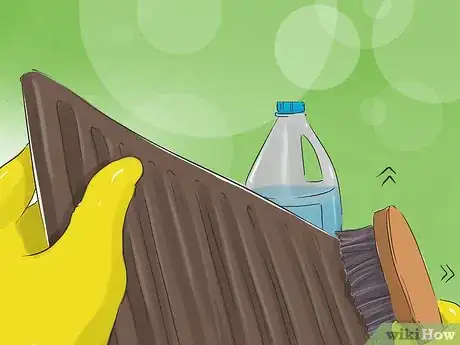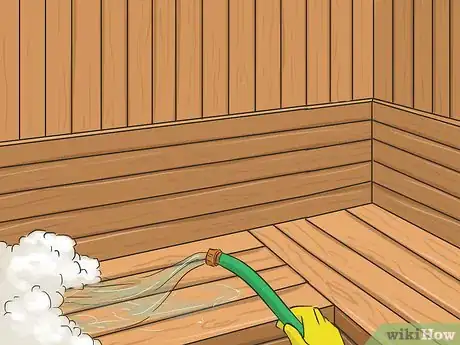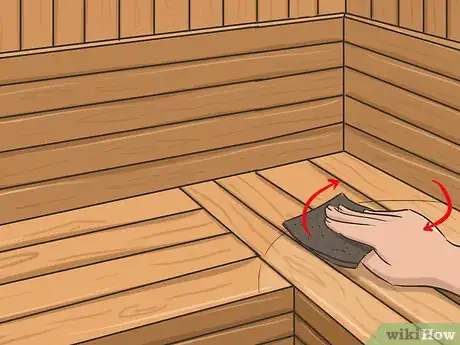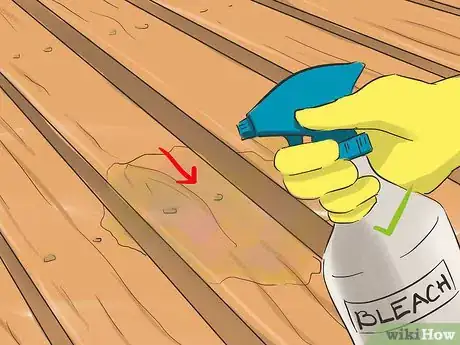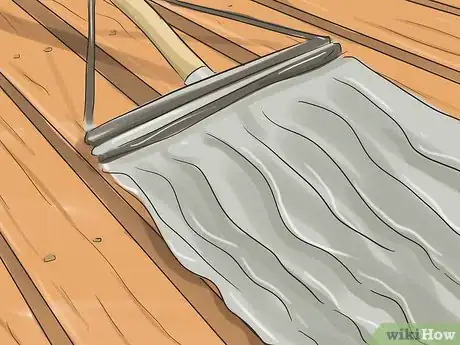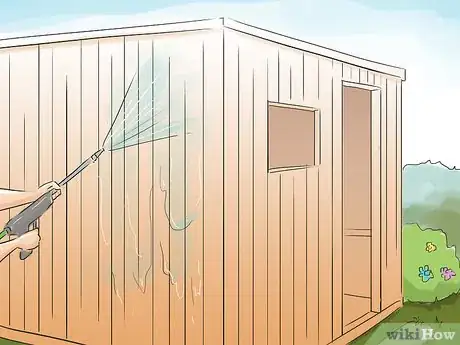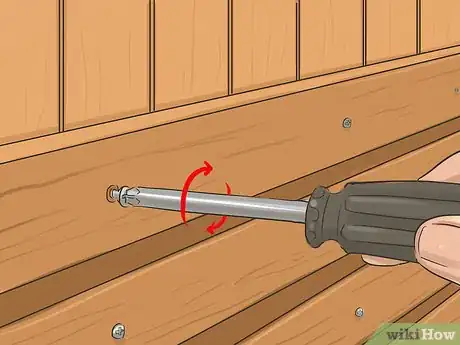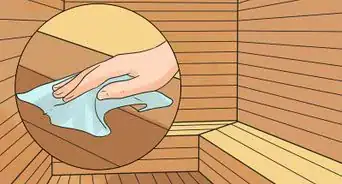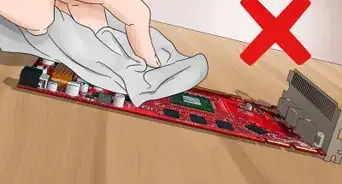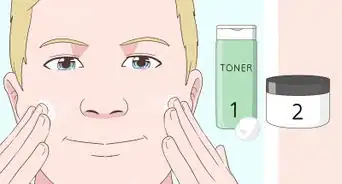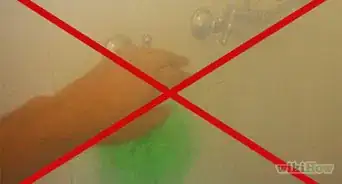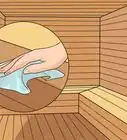This article was co-authored by wikiHow Staff. Our trained team of editors and researchers validate articles for accuracy and comprehensiveness. wikiHow's Content Management Team carefully monitors the work from our editorial staff to ensure that each article is backed by trusted research and meets our high quality standards.
This article has been viewed 119,744 times.
Learn more...
Traditional Scandinavian saunas are usually small rooms made with wooden benches onto which one can sit and feel clean through the use of steam. Because it is a moist environment with dirty skin cells, it is very important that you maintain the sauna on a regular basis. Saunas are relatively sanitary, and so do not require the same kind of heavy cleaning as your bathroom. Proper maintenance of the sauna will keep the environment clean, prevent bacteria and mold from growing, and make sure you get a great experience each time you use it.
Steps
Cleaning After Use
-
1Scrub the benches, walls, and backrests after use. Dip a hand brush into a bucket of water and scrub down all the areas where you, or any other people, sat during the steaming. 30 seconds of scrubbing should be enough for regular cleaning.[1] Rinse the wood down with clean water when you are finished.
- Keep your brush and bucket near the door to remind you to clean as you leave the sauna.
-
2Scrub stains with a hand brush. If you notice stains on the wood from sweat, you don’t want those to stay. Dip your hand brush into a solution of warm water and a mild detergent and [2]
- Use towels in the sauna to prevent stains. You don’t necessarily want to wear one during the steam, but at least lay one down on the bench where you will be sitting. This will prevent too much sweat, dirt, and dead skin from getting into the wood, which is what causes stains.
- If stains are particularly difficult to get out, use a light sandpaper to sand down that part of the wood.
Advertisement -
3Vacuum up the floor. If you tracked dirt, hair, or other stuff on to the floor, use a vacuum to pick up any loose particles. Even if you don’t see any dirt, vacuum every few weeks to get anything that might be in there.<
-
4Disinfect any grates. These include drains or ventilation where moisture may gather, places that might not dry as quickly and can breed pathogens. Take them out of the sauna, and scrub down with a disinfectant to prevent mold and bacteria.[3]
Cleaning Regularly
-
1Rinse out the sauna. Clean out your sauna with soap and a hose to rinse it down. You don’t want anything stronger than a mild cleaner, so avoid stronger chemicals like ammonia. You should do this every few days if you use the sauna everyday, though you can do it less if you don’t use it as often.
-
2Sand benches annually. At least once a year, make sure to sand down your benches with a fine sandpaper. This will help get rid of any impurities that may have gathered over the year, as well as smooth out the surface again. When you are finished, the wood should be a “like new” white color.[4]
-
3Clean out mold. If you notice mold, go after it immediately. A bleach solution is probably your best bet to get rid of it, though certain saunas make their own chemical cleaners.[5]
-
4Mop the floor. It can be beneficial to mop the floor with a deodorizing cleaner to get rid of any odors left over. Remember to avoid harsher chemical cleaners, and stick to soap and water, or cleaners supplied by your sauna’s manufacturers
-
5Periodically pressure wash the exterior. If your sauna is a separate building outdoors, use a pressure washer to clean off the outside. This will keep your sauna looking nice.[6]
- Be very careful not to use the pressure washer on the interior. The wood inside the sauna is softer, and the pressure washer can damage it.
-
6Perform general maintenance. Like any room or building, your sauna will probably also have little things that need work. Make sure to tighten any loose screws and brush out water spots as they appear.[7] This will keep your sauna in good condition, and prevent you from having to do more work later.
- If your sauna has a wooden door, the humidity may cause the door to swell. Keep an eye on the door’s hinges to make sure it opens and closes properly.
Community Q&A
-
QuestionAm I right that it is insane to use bleach for mold in a sauna where people would be inhaling chlorine like soldiers did in WWI. Isn't it much safer to use hydrogen peroxide and baking soda?
 Community AnswerA clear water rinse with a sponge after every use is best, mild soap on occasion, and bleach only as a as a last resort. The most difficult stains I have encountered as a Sauna designer and builder of 30 years are food and drink related. Food and drink (other than water) have no place in Sauna!
Community AnswerA clear water rinse with a sponge after every use is best, mild soap on occasion, and bleach only as a as a last resort. The most difficult stains I have encountered as a Sauna designer and builder of 30 years are food and drink related. Food and drink (other than water) have no place in Sauna! -
QuestionI use a sauna daily which closes at 9:00 pm in the evenings. The cleaning is not carried out until the following morning. Is this bad practice as bacteria and mold can fester overnight?
 Community AnswerRooms should be cleaned at the end of each day when the room is still hot with a sponge and clear fresh water; and a periodic wash with mild soap to prevent staining ( once or twice a week depending on use). Bacteria and fungus can not survive sauna temperatures, so the rooms will generally keep themselves hygienic. However, floors will need to be cleaned carefully, as air temps at this part of the room are much lower!
Community AnswerRooms should be cleaned at the end of each day when the room is still hot with a sponge and clear fresh water; and a periodic wash with mild soap to prevent staining ( once or twice a week depending on use). Bacteria and fungus can not survive sauna temperatures, so the rooms will generally keep themselves hygienic. However, floors will need to be cleaned carefully, as air temps at this part of the room are much lower! -
QuestionI used a solution of baking soda on one of the sauna boards that had a stain, and now the wood is darker. How can I fix this?
 Community AnswerYou can't, the baking soda caused a chemical reaction with the wood, which is why the wood darkened. You essentially added another application of "stain" to the wood. You could try sanding it all down, but depending on how long you let the baking soda sit, you may have to remove quite a bit of material.
Community AnswerYou can't, the baking soda caused a chemical reaction with the wood, which is why the wood darkened. You essentially added another application of "stain" to the wood. You could try sanding it all down, but depending on how long you let the baking soda sit, you may have to remove quite a bit of material.
Warnings
- Do not use paint, varnish, or stain on the inside of the sauna. Artificial finishes prevent the wood from breathing, prevents heat and steam from penetrating the wood, and creates hotter surfaces. They can also release vapors in the sauna, which is dangerous to your health. If you need to treat the wood in your sauna, get some chemicals recommended by your manufacturer.⧼thumbs_response⧽
- Do not pour any liquids other than water on the heating stones. Even in a best-case scenario, you will need to clean or replace the stones. Some liquids can even start fires.⧼thumbs_response⧽
References
- ↑ http://www.finnleo.com/pages/maintenance--construction.aspx
- ↑ http://www.finnleo.com/pages/maintenance--construction.aspx
- ↑ http://www.klafs.com/service/tips-for-cleaning-commercially-used-saunas.html
- ↑ http://www.finnleo.com/pages/maintenance--construction.aspx
- ↑ http://www.finnleo.com/pages/maintenance--construction.aspx
- ↑ https://almostheaven.com/almost-heaven-saunas/care-and-maintenance/
- ↑ http://www.klafs.com/service/tips-for-cleaning-commercially-used-saunas.html
